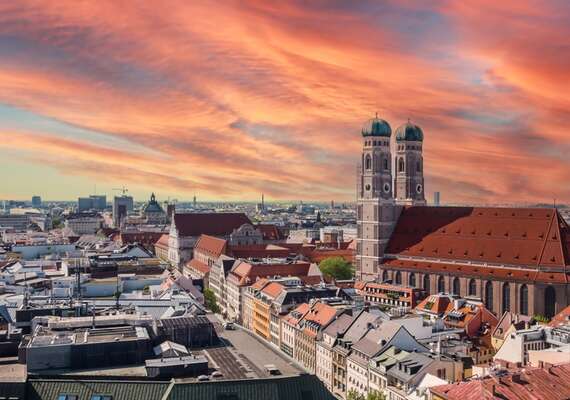Munich City Guide

| Country: | Germany |
| Known Names: | |
| Language: | German |
| Population: | Approx. 1.5 million |
| Religion: | Christianity (Catholic and Protestant) |
| Area Code: | +49 89 |
| Currency: | Euro (EUR) |
| Time Zone: | Central European Time (CET) - UTC/GMT +1 hour; Daylight saving: Central European Summer Time (CEST) +1 hour |
| Visa: | |
| Consulate: |
General Information / Guide
Munich, the capital of Bavaria, is famous for its Oktoberfest, beer halls, and rich history. The city blends modern lifestyle with traditional Bavarian culture, set against a backdrop of historic architecture and nearby Alpine landscapes.
Climate / Weather / When to Go
Munich has a continental climate influenced by its proximity to the Alps, resulting in warm summers and cold, snowy winters. The best time to visit is late spring to early autumn, particularly around September and October during Oktoberfest.
How to Get There
Munich International Airport is among Europe’s major aviation hubs, with excellent connections worldwide. The city is also accessible by an efficient public transportation system including the U-Bahn, S-Bahn, buses, and trams.
Food / Restaurants / What to Eat and Drink
Munich is renowned for its Bavarian cuisine, with specialties like Weisswurst (white sausage), pretzels, and Apfelstrudel. No visit is complete without experiencing a traditional beer garden.
Important Places / Places to Visit
- Marienplatz: The central square featuring the New Town Hall with its famous Glockenspiel.
- English Garden: One of the world’s largest urban parks.
- Nymphenburg Palace: A beautiful Baroque palace that was the summer residence of Bavarian rulers.
- Deutsches Museum: One of the oldest and largest science and technology museums in the world.
- Viktualienmarkt: A daily food market and a square in the center of Munich, known for its variety and quality of gourmet foods.
What to Do
Munich blends traditional Bavarian culture with modern life. Visit the Nymphenburg Palace, or explore the English Garden, one of the world’s largest urban parks. The Deutsches Museum offers insights into scientific advances. For a taste of local culture, watch a traditional Bavarian dance or music performance at a beer hall.
Nightlife / Bars / Entertainment
Munich’s nightlife offers something for everyone, from trendy bars in Glockenbachviertel to classic beer gardens like the Chinesischer Turm. For live music, check out Unterfahrt, a renowned jazz club. Harry Klein is great for electronic music lovers.
Shopping / What to Buy
Munich is known for its fine craftsmanship in Bavarian costumes and beer steins. Viktualienmarkt is the spot for gourmet Bavarian specialties such as pretzels and Weisswurst. For luxury shopping, Maximilianstrasse hosts a range of high-end shops where you can find both international and local designer goods.
Festivals/ Events
January: New Year's Day
February: Munich Security Conference
March-April: Strong Beer Season
May: Frühlingsfest (Spring Festival)
June: Stadtgründungsfest (City Foundation Festival)
July: Christopher Street Day
September-October: Oktoberfest
October: Long Night of Museums
November: Jazz Festival
December: Christmas Markets
Holidays / Festivals / Important Days
1 January: New Year's Day
March or April (variable): Easter
1 May: May Day
3 October: German Unity Day
21 June: Midsummer Festival
16-18 days from late September to the first weekend in October: Oktoberfest
11 November: St. Martin's Day
25-26 December: Christmas
Munich also celebrates various Bavarian traditions and local festivals, including Strong Beer Season in early spring.
Things to Pay Attention to / Important Information
Learn about Bavarian customs and culture before visiting Munich to ensure respectfulness. Dress conservatively and act respectfully in churches and other sacred sites. The Bavarian dialect is distinct and widely spoken here; showing respect for it is important. In markets and during festivals, it’s wise to bargain and keep your belongings secure. Learning basic German or Bavarian phrases can help. Munich can have variable weather, so dress appropriately for the season, and carry water during summer.
Transportation
In Munich, transportation options include U-Bahn (subway), S-Bahn (suburban trains), buses, and trams, coordinated by MVV. This network is extensive and offers reliable service throughout the city and its suburbs at fair prices. Taxis are abundant, and metered fares help avoid overcharging. Driving is common, but parking can be scarce and expensive in the city center.
